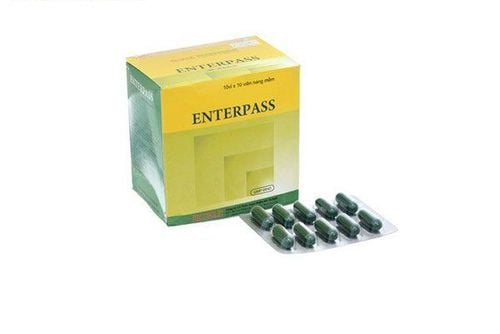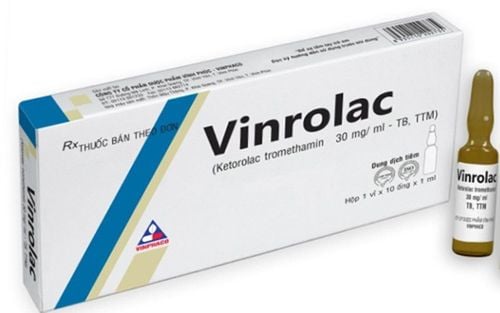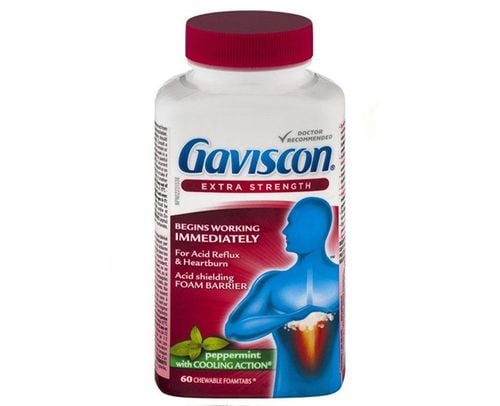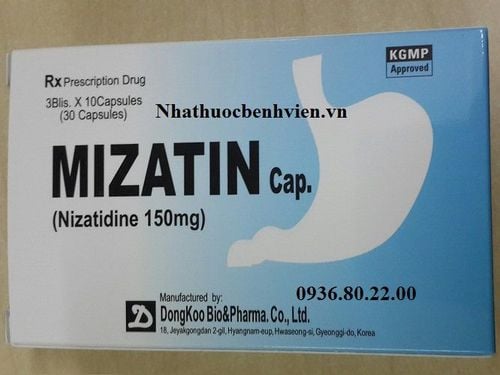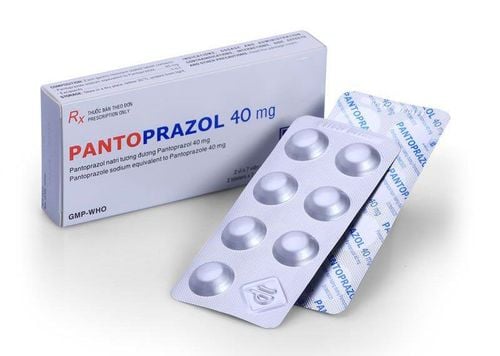This is an automatically translated article.
Mizatin is indicated for the treatment and prevention of recurrence of peptic ulcers and for the treatment of the causes of elevated stomach acid levels, for the treatment or prevention of heartburn. frequent, indigestion,... The following article will help you better understand the uses of Mizatin and the notes when using Mizatin.1. What are the uses of Mizatin?
1.1. What is Mizatin? Mizatin medicine belongs to the group of gastrointestinal drugs, the main ingredients include:
Main active ingredient: nizatidine 150 mg Excipients: Magnesium stearate, Gelatin starch, sodium starch glycolate. Mizatin is made in the form of hard capsules with 150mg content, blisters of 10 tablets, box of 3 blisters. The drug is recommended for use by adults.
1.2. What does Mizatin do? Nizatidine has a formula similar to histamine, so it has a mechanism to prevent gastric secretion by causes of increased histamine secretion in the stomach. The drug reduces both the amount and concentration of HCl in the gastric juice.
Mizatin is prescribed to treat the following cases:
Use for a period of 8 weeks to cure a progressive duodenal ulcer. Most sores heal within 4 weeks. Maintenance therapy with a low dose of 150 mg daily at bedtime in patients with healed active duodenal ulcer. Using Nizatidine continuously for more than 1 year, the results are currently unknown. Mizatin is used in the treatment of benign gastric ulcers with a duration of 8 weeks. Before taking the drug, the possibility of malignancy should be carefully excluded. Mizatin is also used for 12 weeks for the treatment of endoscopically diagnosed esophagitis, including ulcerative and erosive esophagitis, with symptoms of heartburn due to gastroesophageal reflux disease. Heartburn improved after one day of treatment.
2. Usage of Mizatin blood pressure medicine
2.1. How to take Mizatin The drug is taken orally, with a sufficient amount of water. Take the tablet whole, do not break, crush or mix it with any other solution or mixture. 2.2. Dosage of the drug Mizatin Progressive benign peptic ulcer: Take 300mg once a day in the evening or 150mg each time, twice a day in the morning and evening, for 4 - 8 weeks. Treatment lasting more than 8 weeks has not been established. Maintenance dose for prevention of recurrent duodenal ulcer: 150mg once daily in the evening. Treatment can last up to 1 year. Peptic ulcer with Helicobacter pylori: Combination of Nizatidine (now, a proton pump inhibitor is preferred for 1 week) with two of the antibiotics: amoxicillin, tetracycline, clarithromycin, imidazol group antibiotics (metronidazole). Gastro-esophageal reflux disease: 150mg each time, twice a day, up to 12 weeks. It is also possible to take 300mg once at bedtime, but it is better to take it twice. Relieve indigestion symptoms: Take 75mg, can be repeated if necessary, up to 150mg/day, for 14 days. Prevention of symptoms of chest pain, indigestion, heartburn: Take 75mg 30-60 minutes before eating or drinking every day or twice (not more than 150mg/24 hours), not more than 2 weeks. Renal impairment: Reduce dose in patients with renal impairment according to creatinine clearance. Treatment of progressive benign gastric ulcer, progressive duodenal ulcer, creatinine clearance 20 - 50ml/min: Reduce dose by 50% or take 150mg each time. Treatment of progressive benign gastric ulcer, progressive duodenal ulcer, creatinine clearance less than 20ml/min: Reduce dose by 75% or take 150mg once every 2 days. Maintenance treatment of duodenal ulcer: Creatinine clearance 20ml/min: 150mg orally, once every 3 days. Severe hepatic impairment: Dosage should be reduced (1/3 dose) and 150mg capsules used, especially in the presence of renal impairment (Nizatidine is partially metabolized in the liver). Usually missed medications can be taken within 1 to 2 hours of your doctor's prescription. However, if it is too far from the time when you need to take the medicine, you should not make up or double the dose, which can be dangerous for the body. It is better to skip the missed dose and start taking the next dose.
In addition, there are rare cases of Mizatin overdose.
Signs and symptoms: There is little clinical experience with overdosage of nizatidine in humans. Management: When managing an indicated overdose, consideration should be given to the possibility of multiple drug overdoses, interactions between concomitantly administered drugs, and the unusual pharmacokinetics of each individual patient. If overdosage occurs, activated charcoal should be administered, induction of vomiting or bowel lavage with clinical monitoring, and supportive treatment instituted. The ability of hemodialysis to remove Nizatidine from the body has not been clearly established; however, because of its large volume of distribution, it is not expected to eliminate nizatidine from the body by this method.
3. Contraindications of the drug Mizatin
Patients who are allergic to the main active ingredient nizatidine or any of the excipients listed above of Mizatin Because of cross-sensitization between compounds belonging to the H2-receptor antagonist class, including Nizatidine, therefore, should not be used in patients with a history of hypersensitivity to other substances that also antagonize histamine at H2 receptors.
4. Notes when using Mizatin
Before using Nizatidine to treat stomach ulcers, the possibility of cancer must be ruled out, because the drug can mask symptoms and delay the diagnosis of cancer. Cross-sensitivity: Patients who are sensitive to one of the H2-receptor antagonists may also be sensitive to other drugs in the H2-histamine class. Use with caution and reduce dose and/or prolong dosing intervals in patients with renal impairment (creatinine clearance < 50 ml/min) because the drug is eliminated primarily by the kidneys. The pharmacokinetics have not been studied in subjects with hepatorenal syndrome. Partly Nizatidine is metabolised in the liver. In patients with normal renal function, and with uncomplicated liver dysfunction, the elimination of nizatidine is similar to that in normal subjects. Therefore, the risk/benefit should be weighed when used in patients with cirrhosis or impaired liver function (may need to reduce the dose or increase the dosing interval). Nizatidine crosses the placenta. Studies using Nizatidine in pregnant women are incomplete, so use the drug only when clearly needed and on the advice of a physician. A study in rabbits showed that Nizatidine at a dose equivalent to 300 times the human dose caused abortion, reduced number of live fetuses and decreased fetal weight. Nizatidine is excreted in human milk, which may cause serious ADRs in nursing infants. The mother should stop breastfeeding while taking the drug or stop taking the drug. Unlike Cimetidine, Nizatidine does not inhibit cytochrome P450, so it has little effect on the metabolism of other drugs. However, like other H2-receptor antagonists, due to an increase in gastric pH, absorption of some other drugs may be affected.
Antacids: Concomitant use of H2 receptor antagonists may reduce absorption of H2 receptor antagonists. Advise the patient not to take any antacids for 1⁄2 - 1 hour after taking the H2 receptor antagonist. Drugs that cause myelosuppression: Chloramphenicol, cyclophosphamide,... taking with H2-receptor antagonists may increase neutropenia or other hematopoietic disorders. Itraconazole or ketoconazole: Significantly reduces the absorption of these two drugs because H2 blockers increase gastric pH, so H2 blockers must be taken at least 2 hours after itraconazole or ketoconazole. Salicylates: Nizatidine may increase salicylates serum concentrations when co-administered with high doses of acetylsalicylic acid. Sucralfate: Reduces absorption of H2-receptor antagonists, H2-receptor antagonists must be taken 2 hours before sucralfate. Alcohol: Avoid alcoholic beverages. Tobacco: The inhibitory effect on nocturnal gastric acid secretion of H2-receptor antagonists may be reduced by smoking. People with peptic ulcers should stop smoking, or at least avoid smoking, after taking the last dose of an H2-antagonist of the day.
5. Side effects of the drug Mizatin
Nizatidine has few or no side effects despite some recommendations for gynecomastia and decreased male fertility.
Among the adverse reactions in placebo-controlled trials, anemia (0.2% vs 0%) and urticaria (0.5% vs 0.1%) were significantly more frequent. included in the nizatidine groups.
Liver: Damage to liver cells. All of these abnormalities returned to normal after discontinuation of Nizatidine. Since the introduction of Nizatidine, hepatitis and jaundice have been reported. In some cases, cholestasis or hepatocellular injury with cholestasis with jaundice also resolved well after discontinuation of nizatidine. Cardiovascular System: In clinical pharmacology trials, brief episodes of asymptomatic ventricular tachycardia were observed in two nizatidine users and in three non nizatidine users. Central Nervous System: Rarely, transient mental confusion has occurred. Endocrine system: Active ingredient Nizatidine has no anti-androgen effect. Impotence and decreased libido were also observed with the same frequency as in patients taking placebo. Hematology: Common anemia. Very rarely, fatal thrombocytopenia has been reported when nizatidine is used in combination with another histamine H2-antagonist (in one case, the patient also experienced thrombocytopenia while taking other drugs). . Other rare cases, such as thrombocytopenic purpura, have been reported following the administration of nizatidine. Skin: Common sweating and urticaria. Erythema and exfoliative dermatitis have also been reported. Rare hypersensitivity reactions (eg, laryngeal edema, bronchospasm, eosinophilia) have also been reported. Other side effects: There have been rare cases of hyperuricemia/blood not due to gout or kidney stone disease. Rarely, eosinophilia, fever and nausea.
6. How to store Mizatin
Store at room temperature, 59 degrees F to 86 degrees F (15 degrees C to 30 degrees C). Keep out of reach of children and pets
Please dial HOTLINE for more information or register for an appointment HERE. Download MyVinmec app to make appointments faster and to manage your bookings easily.





